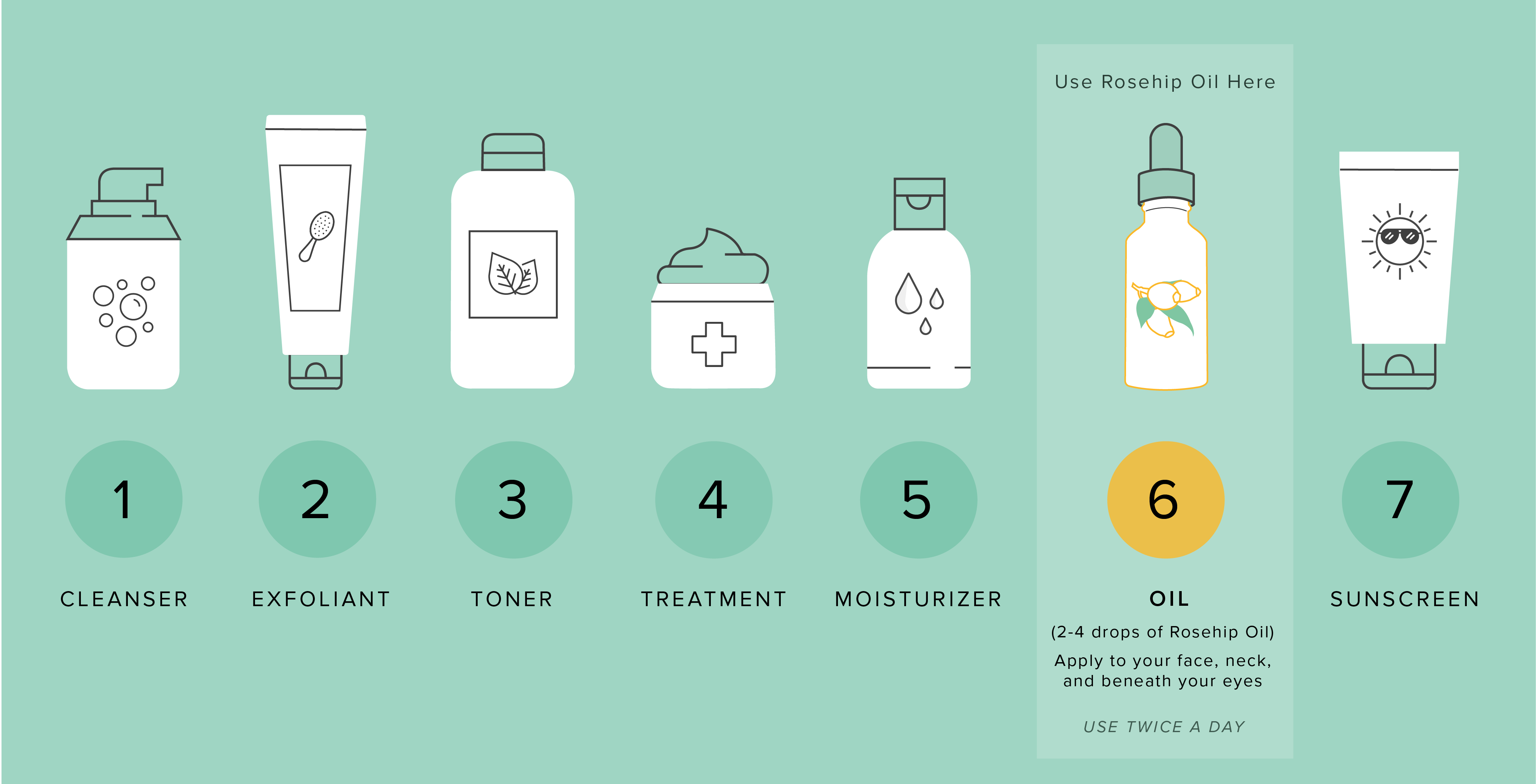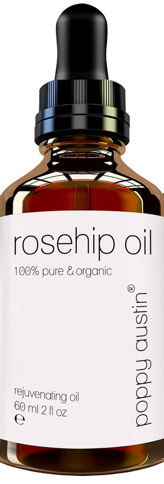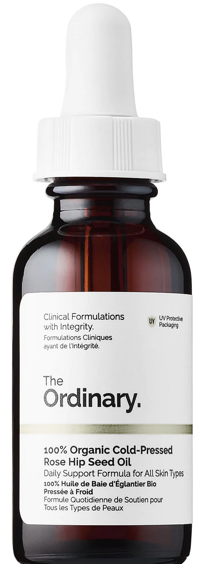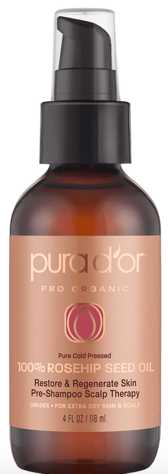Rosehip Oil Skin Care Benefits:
All You Need to Know
Rosehip oil is a plant oil widely used in skin care for its numerous anti-aging benefits. Think of rosehip oil as an anti-aging healer/balancer that's anti-breakout and all-natural. Even better, high quality rosehip oil won’t kill your bank account. Derived from rose fruits and seeds (not rose petals; that’s rose oil), rosehip oil contains many antioxidants (vitamin A, vitamin C, and vitamin E), linoleic acids, and oleic acids. Rosehip oil retains hydration, plumps fine lines and wrinkles, fights free radical damage (sun and pollution damage), brightens skin tone, reduces redness, and leaves the skin velvety soft. Not to mention rosehip oil is also safe for your pores (it has a 1-2 rating on the comedogenic scale), and after absorption, it's not greasy. Rosehip oil is a skin balancer meaning it reduces oil production in oily skin and retains moisture in dry skin (but if you have super dry skin, we recommend argan oil).
Rosehip Oil
INGREDIENT CATEGORY: Essential Oil, Emollient, Occlusives, Plant Extract
BEST FOR TREATING: Brightening, Dryness, Fine Lines and Wrinkles, Redness
SKIN TYPES FOR USE: All
SAFETY: Rosehip oil is safe for topical use in skin care products
GHS TIP: Only buy the good stuff - that means 100% pure, organic, cold-pressed, unfiltered, and non-deodorized rosehip oil.
Top 6 Rosehip Oil Skin Care Benefits
✓ Natural Anti-Aging
PREVENTS FINE LINES AND WRINKLES
Rosehip oil is an anti-aging goddess that both fights free radical damage and retains moisture. Rosehip oil is able to fight free radical damage (skin damage caused by the sun, chemicals, and pollution) thanks to antioxidants like vitamin A, vitamin E, and vitamin C. Because rosehip oil's antioxidants repair free radical damage, they defend against new fine lines and wrinkles, and since rosehip oil helps the skin better retain hydration, rosehip oil also minimizes the presence of existing fine lines and wrinkles (yessss). Overall, rosehip oil is great for skin cell longevity, skin wrinkles, moisture, and elasticity -- all key for maintaining a youthful glow.
✓ Fights Acne
HIGH IN LINOLEIC ACIDS
Rosehip oil is a great option for acne-prone skin because of it's high concentration of linoleic acid. An all-natural, essential fatty acid, linoleic acid has been shown to reduce acne when topically applied. All plant oils contain some amount of linoleic acid, but rosehip oil contains a higher percentage of linoleic acid (compared to other oils like argan oil or jojoba oil) making it a great option for those battling acne. An important thing to note, however, is the linoleic acid in rosehip oil probably won't get rid of your acne on it's own (you'll need ingredients like salicylic acid, glycolic acid, or azelaic acid to get rid of acne at its core), but it will definitely help the cause. If you're struggling with acne, see our complete guide on fighting acne & blemishes.
✓ Reduces Redness & Fades Hyperpigmentation
CALMS REDNESS FOR SMOOTH COMPLEXION
Rosehip oil's vitamin A, vitamin C, vitamin E, carotenoids, and linoleic acids heal the skin. This fab five reduces redness, soothes inflammation/irritation, and heals damaged skin (anything from acne and rashes to infections, bug bites, and burns). Rosehip oil has also been shown to lighten scars and other forms of mild hyperpigmenation.
✓ Locks in Moisture
HELPS RETAIN HYDRATION
Rosehip oil mimics the skins natural sebum (your skin's natural oil) and when applied, creates a protective layer on the surface of the skin that prevents water loss (the same way your natural sebum does). Because rosehip oil acts as a protective layer or barrier, it is categorized as an occlusive. Different from your skin’s natural oil, rosehip oil contains linoleic acid making it even better at retaining hydration than your sebum alone (studies have shown linoleic acid plays a direct role in the skin's barrier function). Because rosehip oil prevents moisture from leaving, rosehip oil balances hydration for all skin types—it helps oily skin de-grease and helps dry skin stay hydrated.
BUT there’s one common misconception we need to clear up: Rosehip oil does not add hydration to the skin, but rather retains existing hydration in the skin by preventing moisture from leaving. Guarding hydration is equally as important as replenishing hydration to the skin—it’s no use to moisturize if the water molecules will instantly evaporate in an Irish goodbye off your face.
✓ Softens Skin
TREATS ROUGH, FLAKY SKIN
Rosehip oil is an emollient that softens and smooths the skin by binding skin cells back together. Great for rough or flaky skin. And don't worry… it's not greasy after it absorbs.
✓ Brightens Complexion
GET THE JLO GLOW
Rosehip oil’s antioxidants brighten your skin. Apply all over the face (including under eyes) for an all natural glow up.
When to Use Rosehip Oil
SKIN CARE ROUTINE OPTION:
Apply rosehip oil after your moisturizer - use 2x a day for maximum results

How to Apply Rosehip Oil
Less is more
A little goes a long way with rosehip oil. Apply 2-4 drops of rosehip oil to your palms, and rub together. Using a gentle, circular motion, apply to your face, neck, and beneath your eyes after serums and creams.

Apply after moisturizer
You cannot hydrate your skin with rosehip oil alone. Rosehip oil forms a barrier on your skin’s surface that retains existing moisture and prevents moisture from leaving, but rosehip oil cannot replenish or add new moisture to the skin.
Order matters—if you apply rosehip oil before you moisturize, the rosehip oil gets in the way, and the moisturizer won’t 100% absorb into your skin. Always moisturize first (to replenish hydration), and apply rosehip oil after (to protect hydration). For maximum skin hydration, use a good humectant (like glycerin or hyaluronic acid) to replenish moisture, and then guard that moisture by applying rosehip oil after.

Follow Up With...
Rosehip oil does not protect from UV rays, so be sure to apply sunscreen daily!
Rosehip Oil in Products


Anti-Aging
Brightness
Dryness
Fine Lines & Wrinkles
Redness


All Skin Types!


Creams
Moisturizers
Oils


Over the Counter
Top 3 Rosehip Oil Skin Care Products
We’ve put together a GHS curated selection of our favorite skin care products that contain rosehip oil for anti-aging, brightening, preventing dryness, and soothing redness. We only link to products that we absolutely believe in. All the products we’ve chosen are paraben-free, sulfate-free, and phthalate-free.
Use as FINAL STEP
Apply a few drops of this oil to your face and neck after you apply moisturizer in the AM or PM.
Price $
Certified: paraben-free, sulfate-free, phthalate-free, organic, cruelty-free, vegan, gluten-free
Use as FINAL STEP
Apply a few drops of this oil to your face and neck after you apply moisturizer in the AM or PM.
Price $
Certified: paraben-free, sulfate-free, phthalate-free, organic, cruelty-free, vegan, gluten-free
Use as FINAL STEP
Apply a few drops of this oil to your face and neck after you apply moisturizer in the AM or PM.
Price $
Certified: paraben-free, sulfate-free, phthalate-free, organic, cruelty-free, vegan, gluten-free
GHS Tips
Go 100% pure
Only buy the good stuff. That means 100% pure, organic, cold-pressed, unfiltered, and non-deodorized rosehip oil. And don’t worry, it won’t break the bank (under $20 a bottle). Please don’t buy any cheap rosehip oil—it won’t work as well and any additives can cause skin irritation.

Dewy vs. Matte finish
Rosehip oil applied under foundation can give you a glowy, dewy finish (not greasy, dewy). If you prefer a matte look, skip rosehip oil in your morning routine, and apply at night only.

Safety Tips
Rosehip oil is Cosmetic Ingredient Review Approved and safe for topical use in skin care products.
SIDE EFFECTS OF ROSEHIP OIL SKIN PRODUCTS:
- For the most part, rosehip oil doesn't cause negative side effects, but on rare occasions, you may see minor redness and irritation, or an allergic reaction (more likely in people with a severe nut allergy)
✓ Wear sunscreen!
✓ Look for 100% pure rosehip oil
✓ Safe to use around eyes
X Don't worry. Not much can go wrong with this one :)
FAQs about Rosehip Oil
Q. Can rosehip oil be used on oily or acne prone skin?
YES. Rosehip oil is safe to use on oily and/or acne prone skin. Rosehip oil has a low rating of 1-2 on the comedogenic scale (a.k.a. not likely to clog dem pores). Plus, the linoleic fatty acids in rosehip oil have been shown to reduce oil production in oily skin types which can help prevent future acne. To get specific, all skin types benefit from rosehip oil, but because it's extra high in linoleic acids, rosehip oil is a top choice for oily skin compared to other plant oils like argan oil (best for dry skin) or jojoba oil (best for normal skin).
 Q. Is rosehip oil good for acne?
Q. Is rosehip oil good for acne?Yes, but to truly fight acne, use rosehip oil in combination with an FDA-approved, acne-fighting ingredient, like benzoyl peroxide or salicylic acid. Rosehip oil retains hydration in acne prone skin with a very low chance of clogging pores, and the antioxidants in rosehip oil sooth acne inflammation, redness, and irritation. Rosehip oil also helps with oil control which can help prevent future acne from developing, BUT you still need a big boss acne-fighting ingredient, like benzoyl peroxide or salicylic acid, to get rid of breakouts. Think of rosehip oil as a way to keep your skin healthy and hydrated without triggering additional breakouts - you’ll still need the big boss ingredients to get rid of existing acne.
 Q. Is rosehip oil good for dry skin?
Q. Is rosehip oil good for dry skin?Yes. Rosehip oil is good for dry skin because rosehip oil prevents moisture from escaping your face; however, if you have super dry skin, we recommend trying argan oil instead. AND REMEMBER, rosehip oil does not add hydration to the skin—it protects existing moisture from leaving. So always apply a moisturizer first to replenish hydration and then rosehip oil after to keep it hydrated.
 Q. Will rosehip oil clog pores?
Q. Will rosehip oil clog pores?No, very unlikely. Rosehip oil has a low rating on the comedogenic scale—1-2 out of 5—so rosehip oil is anti-clog approved.
 Q. Will rosehip oil make my skin less oily?
Q. Will rosehip oil make my skin less oily?Yes, rosehip oil can help you be less oily and de-grease. Rosehip oil helps balance skin hydration regardless of skin type thanks to it’s high concentration of linoleic fatty acids. So, if you have oily skin, rosehip oil helps reduce oil production, and if you have dry skin, rosehip oil helps lock in moisture. The skin often produces extra oil or sebum when it’s dry—it’s a defense mechanism to protect you from drying up into a crusty raisin. Because rosehip oil helps keep the skin moisturized and hydrated, rosehip oil has been shown to decrease oil/sebum production in oily skin types.
 Q. Can rosehip oil remove fine lines and wrinkles?
Q. Can rosehip oil remove fine lines and wrinkles?No, sadly, rosehip oil cannot erase existing fine lines and wrinkles. However, by helping the skin stay hydrated, rosehip oil can make existing wrinkles noticeably less visible or completely masked.
 Q. Can rosehip oil lighten skin?
Q. Can rosehip oil lighten skin?No, rosehip oil cannot lighten your skin tone. If hyperpigmentation is a top concern for you, we recommend trying a product with arbutin, azelaic acid, AHAs (i.e. glycolic acid) or vitamin C.
 Q. Can rosehip oil help rosacea?
Q. Can rosehip oil help rosacea?Rosehip oil’s anti-inflammatory properties help calm redness from inflammation, but rosehip oil has not been proven to treat rosacea. Rosehip oil may benefit rosacea, but more conclusive research is needed.
 Q. Does rosehip oil expire?
Q. Does rosehip oil expire?Yes, rosehip oil has a shelf life—two years max. Use rosehip oil within six months of opening for optimal benefits (the quality does degrade over time). Always show your skin care products a little TLC by tightly sealing after use and storing in a cool, dark place (as in away from direct sunlight).
 Q. How can I tell if my rosehip oil has expired?
Q. How can I tell if my rosehip oil has expired?Rosehip oil should smell sweet with a smooth and silky feel. If your rosehip oil feels slimy or extra thin, it’s expired. If it smells rancid or starts to sting your skin, drop it like it’s hot.
 Q. What are common names used to identify rosehip oil on an ingredient list for skin care products?
Q. What are common names used to identify rosehip oil on an ingredient list for skin care products?- Rosehip oil
- Rosehip seed oil
- Rosa canina
- Rosa moschata
- Rosa rubiginosa

Related Pages
How to Treat Dryness - Causes, Treatments, & Top Ingredients
10 Best Hydrating Products for Treating Dry Skin
10 Best Cruelty-Free Products for Treating Dry Skin
How to Treat Fine Lines & Wrinkles - Causes, Treatments, & Top Ingredients
10 Best Products for Preventing Fine Lines & Wrinkles
10 Best Cruelty-Free Products for Preventing Fine Lines & Wrinkles
Want More GHS Tips?
It’ll be the best thing to ever slide into your DM's.


